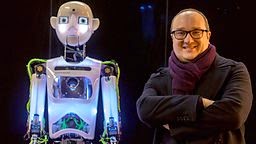Tomorrow's Worlds: The Unearthly History of Science Fiction Episode Three - Robots
Sunday, 7 December 2014 - Reviewed by
Transmitted BBC2, 6th December 2014
In the third of a strong run of themed documentaries that have so far examined Space and Invasion, this week, Tomorrow's Worlds takes on Robots.
Starting off in Oxford, Dominic Sandbrook pores over the original manuscript of Frankenstein, arguing convincingly that it is the first true Science-Fiction novel, and highlighting the original, oft-forgotten subtitle of Mary Shelley's tale - The Modern Prometheus.
Frankenstein is a very early manifestation of a fear of where exactly scientific hubris could lead man, should he try to play god. Society develops an interest in robots, of which Victor Frankenstein's intelligent, yet tortured creature is a clear ancestor - but yet, argues Sandbrook, our techno-fear has never quite left us, particularly when we anthropomorphise robots. The bottom line is that we don't really trust them, especially when they mimic our behaviour and try and be like us, a theme he comes back to later on.
As with the previous episodes, Sandbrook engagingly draws some neat lines and parallels, detouring away from the prevailing image of the evil killer robots for a while, he looks at the good ones. He moves neatly through Asimov's Laws of Robotics and Robbie the Robot from Forbidden Planet to reach the cute, non-humanoid Hewie, Dewie, and Lewie from Silent Running, and their famous successors R2-D2 and C-3PO. Threepio is humanoid, (and owes a clear, acknowledged debt to the iconic Maria from Fritz Lang's Metropolis) but Artoo of course is not, it's the humanised performances of Anthony Daniels and Kenny Baker that lends the droids their unthreatening, likeable character in the same way that Arnold Schwarzenegger's remorseless, cold-as-ice Terminator characterises the classic killer robot. Daniels smilingly speaks of a meeting with roboticists in which he points out that they don't know what it's like to be a machine and he does, but this is an actor's sense of hype more than anything else. Nobody could ever really know.
Sandbrook moves from here back to more familiarly dystopian territory, to the man-machine hybrid of the aforementioned Terminator, but more importantly the faceless, automated threat of Skynet, which had much in common with Ronald Reagan's infamous 'Star Wars' orbital defence system. The possibility of machine turning on man when man does something that doesn't fit with programming or 'the mission' is illustrated by the still-chilling sequence in 2001 where HAL politely tells Dave Bowman that he's sorry, he can't open the pod bay doors.
The promethean theme of Frankenstein returns with Spielberg's AI, where a robot child tries to be loved, and to be human, with the human-infiltrating Cylons of Battlestar Galactica, and most compellingly, with the Creature's punk grandson - Blade Runner's Roy Batty.
Sandbrook moves seamlessly from machines trying to be men to men becoming machines, first in passing where he points out the dubious morality in essentially trying to lobotomise Alex in A Clockwork Orange, and then more fully when he looks at everyone's favourite tragic spare part surgery enthusiasts, the Cybermen. David Tennant and Neil Gaiman pop up to discuss their enduring appeal, illustrated by clips from Tomb of the Cybermen and their 2006 revival under Russell T. Davies. The clips from Rise of the Cybermen/The Age of Steel aren't the best illustration of the Cybermen's chilling body horror, but time slots are limited, and there is a huge amount of ground to cover here, which Sandbrook does expertly. The haunted, reticent Six Million Dollar Man and Paul Verhoeven's savage satire Robocop are both referenced as a not-so far gone example of where Kit Pedler and Gerry Davis's nightmare vision of repairing ourselves could lead. Interestingly, Star Trek's famous Borg, a similarly chilling premise based on assimilation and absolute conformity, don't get a look in.
The contributors are excellent value throughout, John Landis, Douglas Trumbull, Peter Weller, Paul Verhoeven, Keir Dullea, Gale Ann Hurd, a scarily grown-up Haley Joel Osment, Brian Aldiss, a thoughtful Edward James Olmos and Ron Moore, and best of all, a twinkling Rutger Hauer, who reprises his wonderful "I've seen things you people wouldn't believe..." speech from Blade Runner.
Things only drift a little off-piste at the end, when we move to William Gibson's coining of the concept of cyberspace in Neuromancer and segue into the VR world of The Matrix. Relevant? Yes. Robots? Not so much. Also, Tron rather unfairly misses out on the party here, a much earlier version of a virtual world and man versus machine - less edgy, but still pioneering.
Nevertheless, minor quibbles aside, this is still an excellent, thoughtful hour of television. The full series probably deserves a director's cut of sorts, trying to cover such a lot of ground coherently in an hour timeslot is always going to be a headache. Sandbrook signs off neatly by suggesting that we are still not entirely comfortable with creation, and that's why these stories keep on coming.
Next week: Time. Or was that last week?





